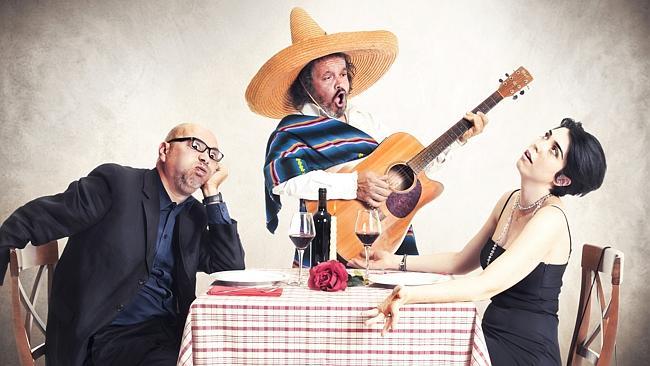Reservations about dining out on Dimmi-LinkedIn link-up
What are the chances the reservation service’s tie-up with LinkedIn will improve anyone’s restaurant experience?

For anyone blessed with a modicum of intelligence or paranoia — or, for the very lucky among us, both — dining out is about to become a much more fraught experience. While it’s not quite setting an extra place for Big Brother and starting the meal with a bracing sharpener of Victory Gin, news that Australia’s largest restaurant reservation service, Dimmi, and Australia’s least useful social network, LinkedIn, have tied up to build profiles on customers that include not just how one likes one’s steak but what one does for a living gives pause.
As reported in the press this week, the idea is to build “rich customer profiles” and “inspire more memorable dining moments”.
Silly us. We thought the key to providing a good experience for diners involved providing great food for the money served by friendly, knowledgeable staff, not swimming around in the swamp of big data, using algorithms to puzzle out whether car dealers prefer their oysters mornay while accountants would rather have them au naturel.
And this is before thinking of all the ways the system could break down. How, for example, will Dimmi know it has the right LinkedIn profile? There are numerous James Morrows in the world; one writes this column for The Australian and snarks around on Twitter (@pwafork if you’re so inclined), another one — a distant cousin — writes fantasy novels with a theological bent in the US. The mind boggles as to how the computers may try to adjust our service accordingly.
Similarly, the clever diner could easily game the system, telling LinkedIn that, for example, they are an undercover reviewer for the Michelin Guide. More than a few joints would fall fawningly for the ruse. And how long until the Australian Taxation Office and the Australian Bureau of Statistics see an opportunity in all this? Will back-of-house gossip become not about who played the gluten-free card yet ordered ravioli but, rather, “Computer says table 15 has four kids, get them the bill, the babysitter’s waiting”, or “Table eight shouldn’t be able to afford that wine on his reported income, better flag an audit”?
For all the enthusiasm among Dimmi’s restaurant “partners”, not everyone in the industry is convinced this is a great idea. Martin O’Connor, who went from a career managing fine diners to opening MOCO Restaurant Consultants with the aim of helping restaurants deliver world-class service, says that while restaurants with dedicated reservations managers may try to find out a bit extra about customers or note things such as favourite drinks or birthdays, with the system envisioned by Dimmi “it will become just about stockpiling information while taking away from restaurants their ability to build up … real relationships with their customer”.
He says the effort by restaurants to use technology to crack a simple code threatens to kill the thing it is intended to facilitate: “What has happened to the spontaneity and mystery of dining? That whole experience of meeting guests and offering what you do, that’s the magic, and that’s what is being eroded.”
The secret to hospitality isn’t big data, says O’Connor, it is “about being genuine and about being warm and welcoming: attracting people with good food and good service. People who do that are full all the time.” The temptation behind processing customers through the maw of big data is that it becomes “a way for average places to cheat and try to do things in an incorrect and lazy manner”.
Of course, humans can be prone to error in hospitality, too. A friend in his single days used to bring romantic prospects to a country restaurant with an inn attached, telling each one it was a special place he’d only just learned about. Many happy visits occurred until one Friday an unaware waiter said, “Oh, great to see you again, Mr So-and-so! Back already?”
Predictable hilarity ensued, even if other things didn’t.
